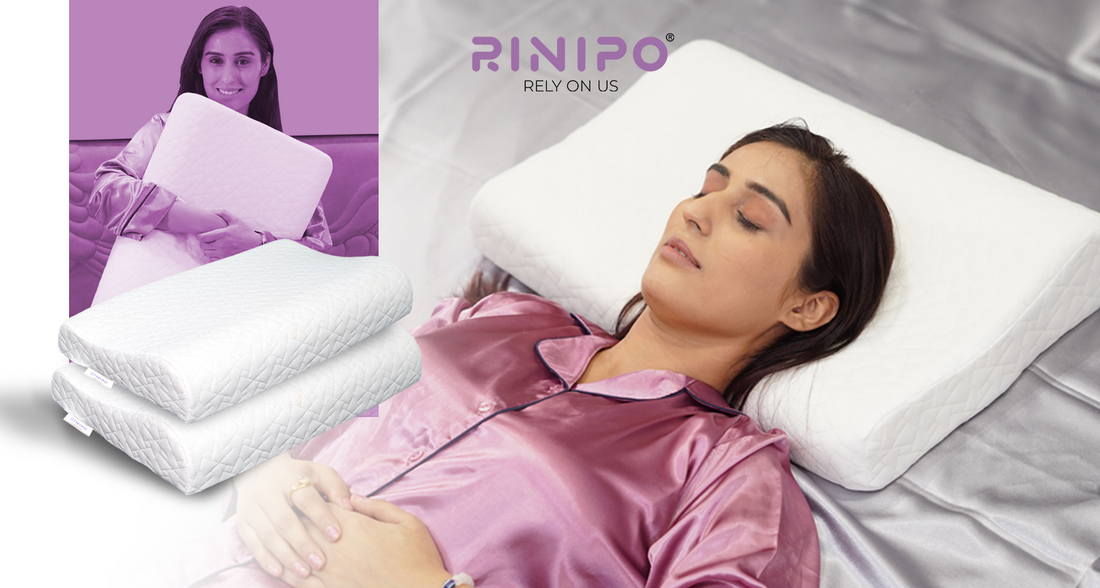
Do Memory Foam Pillows Really Help with Neck and Back Pain?
Share
Do Memory Foam Pillows Really Help with Neck and Back Pain?
In today's world, where most of us spend long hours sitting at desks or lying in bed, neck and back pain have become widespread complaints. Whether it's from poor posture, long hours of screen time, or just the stress of daily life, finding relief is a top priority for many. One of the solutions most suggested is the use of memory foam pillows. But are these pillows effective for neck and back pain, or is it another marketing gimmick?
Let's get into how memory foam pillows function and if they really deliver the help needs to reduce neck and back pain.
What Are Memory Foam Pillows?
Memory foam pillows are constructed using viscoelastic foam, which is an agent that reacts to body pressure and heat. The foam conforms to the shape of your neck and head and gives specific advice. The most important aspect of memory foam is its property to conform to your body so that it distributes weight evenly and takes pressure off main aspects.
Although memory foam is most often linked to mattresses, its application to pillows has become increasingly popular over the last few years because of its promise for neck and back health.

How Do Memory Foam Pillows Work?
The main job of a memory foam pillow is to cradle the natural shape of your neck and spine when you sleep. Good support is what keeps you in proper alignment, which can additionly shrink pain and unease. Here's why it works:
Neck and Spine Alignment: Memory foam pillows are constructed to support your head and neck in a position that ensures good spine alignment. This minimizes pressure on your neck and back muscles and joints.
Pressure Relief: The foam conforms to the distinct design of your head, neck, and shoulders, which relieves strain factors. This is especially beneficial for humans who suffer due to trouble created by muscle tension or poor posture.
Even Weight Distribution: Memory foam spreads out your head weight evenly on the pillow so that parts don't become overly compressed or strained. The even weight distribution may alleviate the pressure on your spine and thereby reduce pain.
The Benefits of Memory Foam Pillows for Neck and Back Pain
Now that we know how memory foam pillows function, let's discuss the potential benefits they provide for persons with neck and back pain.
Improved Neck Support Perhaps the greatest advantage of memory foam pillows is their ability to provide improved neck support on top of traditionnel pillows. Most regular pillows do not give enough support for the neck, which causes improper spinal alignment and pain. Memory foam pillows, on the other hand, shape to the natural curve of the neck and thereby alleviate tension and strain.
Prevention and Relief from Pain Proper neck support can often go a great distance in relief from neck pain, especially in cases of conditions like cervical spondylosis or tension in the muscles. Memory foam pillows decrease headache resulting due to improper sleeping posture because they minimize pressure on the cervical spine and muscles.
For people who are experiencing back pain, a memory foam pillow can promote relief through modified spinal alignment. The support of the pillow promotes a neutral spine position, which reduces tension on the ligaments and back muscles.
Personalized Support Unlike regular pillows, which are usually too hard or too soft, memory foam pillows conform to the individual's personal requirements. This modifying provides a sounder night's sleep, giving your neck and back the option to rest in the most optimal position.
Diminued Impact on Sensitive Areas For those suffering from pain from strain aspects such persons with herniated discs or sciatica), the way memory foam conforms to the body reduces pressure on vulnerable areas. By dispersing weight equally, memory foam lessens the likelihood of waking up with areas that feel painful.
Durability and Long-Term Support Memory foam pillows have a reputation for being durable. In contrast to down or pillows made of natural materials, memory foam doesn't lose its shape after some time. Such uninterrupted support is important when dealing with chronic pain since it keeps the pillow effective for a long time.

Are Memory Foam Pillows Suitable for Everyone?
Although memory foam pillows have a number of benefits, they could lack suit everyone. Here are some points to consider:
Sleeping Position: Your sleeping position is an relevant aspect of if or not a memory foam pillow is suitable for you. Back sleepers will find that a memory foam pillow can give maximum support to their neck and spine. Side sleepers, on the others may necessitate a firmer pillow to help them keep proper alignment. Memory foam can be too firm for stomach sleepers, and they may prefer a softer, thinner pillow to prevent straining of the neck.
Allergies: Some people could be sensitive to the substances used in memory foam. Although most contemporary memory foam pillows are hypoallergenic, severe people with allergies have to scrutinize the product description before buying.
Temperature Sensitivity: Memory foam has a reputation for retaining heat. If you are a hot sleeper, foam pillows too warm. Luckily, many memory foam pillows today are equipped with cooling technology to overcome this problem.
Firmness Preference: Memory foam pillows come in a variety of firmness levels. Some people may prefer the soft, contoured feel of memory foam, while others may find it too firm. It is crucial to choose the right firmness for your comfort and pain relief needs.
When choosing a memory foam pillow for alleviating neck and back pain, the following are some guidelines:
Select the Appropriate Size and Shape: Memory foam pillows are available in different shapes like the traditional, contoured, and cervical. Contoured pillows are specifically shaped to support the neck and back and could be best suited for those with neck pain.
Take into Account the Firmness Level: Based on your sleeping position and personal preference, select a pillow with appropriate firmness. A medium-firm pillow usually provides the most perfect equilibrium between support and comfort.
Seek Out Cooling Properties: If you tend to sleep hot, look for a pillow which includes cooling gel or breathable materials to minimize heat buildup.
Test for Durability: Opt for premium memory foam that will not lose its form after extended usage.

